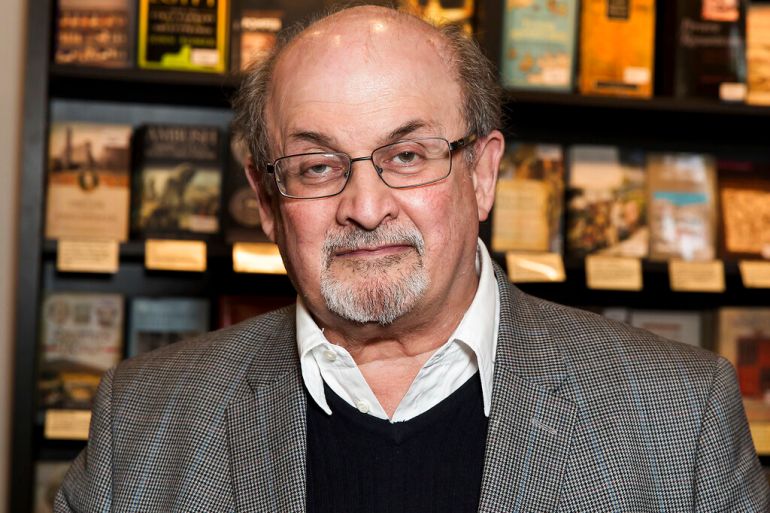Key dates in the life of author Salman Rushdie
The controversial author spent years in hiding after a 1989 decree by the Iranian leader led to threats against his life.

Author Salman Rushdie has been hospitalised after he was attacked earlier today at an event in New York state.
Police have said that Rushdie was apparently stabbed in the neck, but stated that the motive and the weapon used in the attack are still unknown. Reuters has reported that he is in surgery, and New York Governor Kathy Hochul has said Rushdie is “getting the care he needs”.
Rushdie’s writing led to death threats from Iran in the 1980s, which banned his most famous book, The Satanic Verses, in 1988. A year later, Iran’s late leader Ayatollah Ruhollah Khomeini issued a religious edict calling for the author’s death.
Iran also offered more than $3m for anyone who kills Rushdie. Iran’s government has since distanced itself from Khomeini’s decree, but Rushdie has remained a deeply controversial figure. Rushdie spent time in hiding under the pseudonym Joseph Anton.
Here is a timeline of Rushdie’s life:
June 19, 1947: Rushdie is born in Bombay, now Mumbai, India.
1981: His second novel, Midnight’s Children, wins the Booker Prize.
1988: The Satanic Verses is released but is quickly banned in Bangladesh, Pakistan, South Africa and other countries. India also bans it from being imported.
1989: Iran issues a “fatwa”, or religious decree, calling for Rushdie to be killed for insulting Islam in The Satanic Verses. He lives underground for more than a decade, moving between safe houses and living under the pseudonym Joseph Anton.
1990: Newsweek publishes an essay by Rushdie, In Good Faith, in which he sought to defend the novel.
1993: He participates in the founding of the International Parliament of Writers aimed at protecting writers and freedom of speech. It was dissolved in 2003.
1995: After six years under police protection and living in safe houses, Rushdie appears in London in his first pre-announced public appearance since the fatwa was issued.
1999: Mumbai-born Rushdie is granted a visa by the Indian government to visit his country of birth, triggering protests by Muslims.
2005: Shalimar the Clown, is published, with many narrative threads revolving around Indian-administered Kashmir.
2007: He is knighted by Queen Elizabeth II for his services to literature, prompting widespread protests among Muslims, notably in Pakistan.
2008: Rushdie’s novel Midnight’s Children is named the “Booker of Bookers” after winning a public vote for the best Booker-winning novel in 40 years of the award.
2009: Iran says the religious edict is “still valid”.
January 2012: Rushdie cancels plans to attend a literature festival in Jaipur, India, after protests from some Indian Muslim groups.
2012: Rushdie publishes Joseph Anton, a memoir looking back at his years in hiding.
2014: Rushdie wins annual PEN/Pinter Prize for his support for freedom of speech and what judges call his generous help to other writers.
2015: Two Years, Eight Months and Twenty-Eight Nights, is released.
October 2015: Rushdie warns of new dangers to freedom of speech in the West amid tight security at the Frankfurt Book Fair. The Iranian Ministry of Culture cancelled its national stand at the fair because of Rushdie’s appearance.
2016: Rushdie becomes a US citizen after about 20 years of living in New York.
2020: Rushdie is short-listed for the Booker Prize for, Quichotte, a modern version of the Spanish epic, Don Quixote, by Miguel de Cervantes.
2022: Rushdie is made a Companion of Honour in the British Queen’s annual birthday honours.
August 2022: Rushdie is attacked on stage at a literary event in Chautauqua, western New York state, and is flown by helicopter to a local hospital for treatment.